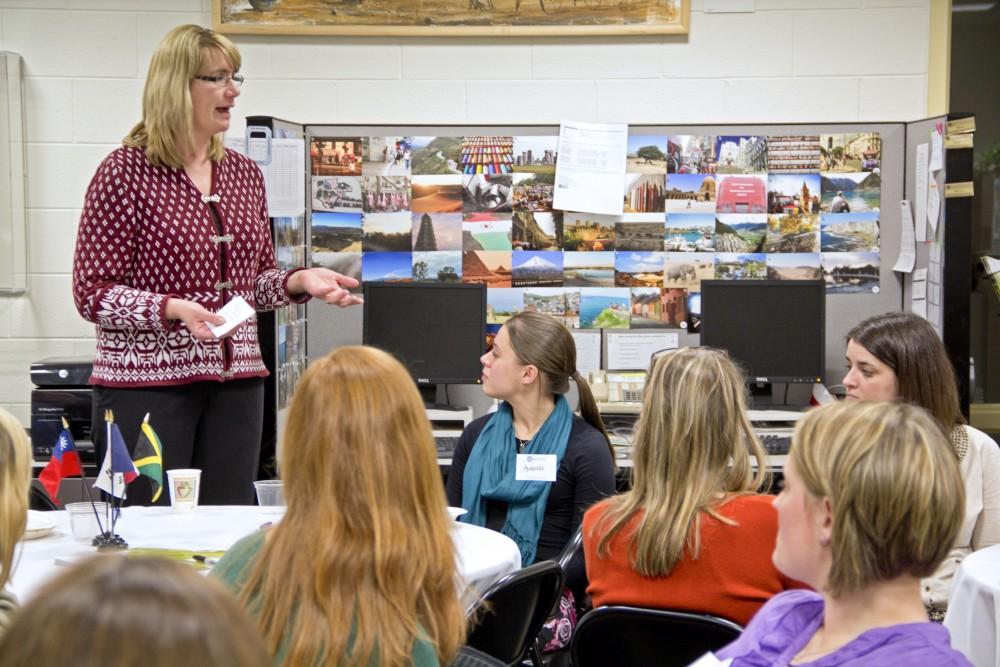Study abroad students settle back home

Megan Sinderson/ GVL Lisa Knapp speaking with Study Abroad Alumni Association members about the ways international experience can benefit a future career at the Welcome Home Dinner.
Jan 30, 2013
To welcome back Grand Valley State University students from their semesters abroad, the Padnos International Center hosted a dinner to reconnect students to the university and to share their stories with others who studied abroad.
The program on Jan. 28 included a dinner, a presentation about the challenges of coming back from abroad and lessons to translate abroad experiences to job skills.
Mark Schaub, chief international officer at the Padnos International Center, said the program began as a way to re-enter students to the GVSU campus.
“(It started as a way) to intentionally discuss with them the reverse culture shock and challenges, and to help them focus on how they can articulate their experiences in useful ways in their career advancement,” Schaub said.
PIC has hosted this dinner for the past eight years.
“(The goal is for student to) know that they are not alone in their re-entry experiences and challenges,” Schaub said. “(It’s also to) be aware of support resources.”
During dinner, Eric Klingensmith of the GVSU Counseling and Career Center explained the re-entry shock that many students feel when they come back from abroad.
“This is not unique,” he said. “Everyone next to you, the people around your table, have gone through this.”
During the discussion, students shared what they missed about the countries they visited, frustrations with returning and the differences they noticed.
“Living in a way that different than us, (with) the little things we have here—it puts things in perspective,” Klingensmith said.
Study abroad students also shared what helped them reconnect when they came home, and Klingensmith said the key to reconnecting is preparation.
“Whether it’s before, while abroad or when you come back, the best thing you can do is get prepared,” he said.
Many students said staying connected with family and friends back home wasn’t a main problem because of technology like Skype, but it was harder to connect with friends they met while abroad. Klingensmith said the students should keep telling the stories and sharing their trip to keep them linked to their experience.
“Family and friends may get tired of the stories, (and) they may want the 30-second versions,” he said. “But by sharing with others (you are) keeping the memories alive, staying connected.”
Klingensmith said study abroad students should share their stories with potential and future study abroad students to “help out the next generation.”
After students shared how they coped with the adjustment back to America, Lisa Knapp of GVSU Career Services explained how study abroad students can use their trip experiences to their advantage on resumes and job searches.
Many students learn a lot while studying abroad, and Knapp said it’s important to put those experiences into practical skills.
“Study abroad matters,” she said. “It’s your job to translate to your employers.”
Knapp said skills such as problem solving, flexibility and communication are realistic techniques learned through study abroad that can become resume builders.
“It’s important to think about these (skills) ahead of time, before the interview,” she said. “Think about transferable skills, make a list.”
Knapp added that one of the biggest skills employers look for is adapting to the workplace culture, which study abroad students are familiar with.
“(You’ve) already adopted to the norms of another culture,” she said. “That’s something you can bring to the workplace that others cannot.”
Alissa Lane of the Padnos International Center shared other ways that students can continue their study abroad experience and connect with others. Lane said the Study Abroad Alumni Association allows students to talk to other students who have studied abroad and to share their experience with others.
“Every student who has studied abroad at GVSU is a member (of the organization),” Lane said.
Students returning from study abroad, or considering the experience, can find more information about future events or opportunities at www.gvsu.edu/pic.
[email protected]

























